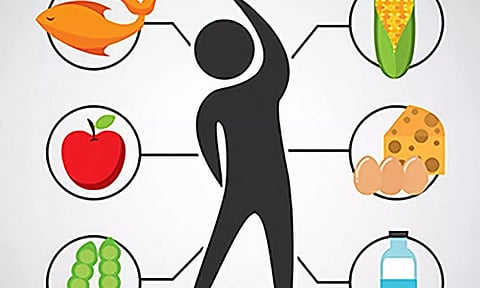
- Home
- Live Blog
- Breaking News
- Top Headlines
- Cities
- NE News
- Sentinel Media
- Sports
- Education
- Jobs

After recovering from the COVID-19 infection, most people want to get back to their normal lives. While some continue to be careful and follow all COVID protocol, some tend to let their guard down. Along with all the medicines and multivitamins that you might be taking, including a healthy meal in your diet and a little bit of physical activity while recovering from COVID-19 is equally important.
To fight the infection and prevent them from spreading in your lungs, your body naturally needs more energy and fluids, as it is important to fuel yourself with nutrient-rich food and exercises.
You need to have a nutrient and supplement-rich meal regimen to help speed up the recovery. Coronavirus opens the body to tons of stress and the medicines can debilitate your body. Few patients experienced weight loss or weight gain. Your food should contain organic products, vegetables, eggs, milk, and safe poultry to compensate for the lost appetite. You should have food that is cooked and simple to digest. A balanced diet high in calcium, vitamins, zinc, and protein is what the doctors have been saying.
Here are some of the diets you can follow to recover from covid-19...
While fighting the virus inside your body, a lot of energy is used, that makes you feel tired and exhausted. Adding calorie-dense food to your diet is necessary at this time to get back to the form. Including whole-grain cereals like millets, oats, rice, cheese, red meat, oily fish, nuts, and starchy vegetables like potato, sweet potato can help to increase calorie intake and energise you. You should eat slowly, take small bites, and breathe deeply while chewing. Eat while sitting up and choose foods that are easier to chew.
Protein is the building block of life and is required by our body for faster recovery. When suffering from COVID-19, it is recommended to eat a high protein diet. It will help repair our body tissues during recovery and also support our overworked immune system fighting the infection. If you feel weak and experience breathlessness, increase the amount of protein in your diet to prevent muscle loss and enhance the strength of respiratory muscles. Taking 75-100 grams of protein is essential every day. So, add more food like lentils, legumes, milk and milk products, soy, nuts, seeds, meat, chicken, fish, and eggs.
Fresh fruits and vegetables are loaded with immune-boosting, antioxidants, vitamins, and minerals. You should add these to your diet for faster recovery and strengthening your immune system. Make sure to add 5 portions of fruits and vegetables in a day. Citrus fruits are packed with vitamin C, which helps in the formation of antibodies and fights infection, while green and root vegetables help to strengthen the immune system. Spend some time outdoors to get a sufficient amount of vitamin D.
Water is an essential element for life as it carries nutrients in the blood, regulates body temperature, and flush out toxins from the body. Besides, an infection can dehydrate the body. Try to drink 2.5-3 litres of water each day. You can also drink fruit juices, coconut water, thin buttermilk, and lemon water with a pinch of salt. You can even try chicken or vegetable soup. You can also consume herbal concoction, coconut water, milk and fresh juice. Avoid packed juice, caffeine, and fizzy drinks.
In case of physical exercises, here are some of the physical activities you can do after recovering from COVID:
Even if exercising is troublesome immediately after recovering, as your body is weak, you may do light exercises by just moving your hands and feet.
Breathing exercises will strengthen your diaphragm during your recovery phase and bring in the vital oxygen into your bloodstream. It may increase lung capacity, subsequently strengthening your lungs. Deep breathing will also keep you calm and alleviate symptoms of anxiety and fear. You can lie or sit down to do breathing exercises. Belly breathing or diaphragmatic breathing is a technique found to be beneficial in improving lung capacity and function.
During the recovery stage, many people struggle to sleep well. They struggle to fall or stay asleep, some wake up too early. This may have been triggered by anxiety, fear, and loneliness during isolation. So, after recovering from COVID, try to get enough sleep of about 8 to 10 hours a day, because when you sleep, your body speeds up the recovery process. Also, try to avoid using gadgets as it can cause distraction.
Normally, it takes about 3 weeks for a COVID patient to recover but this is subject to the severity of the attack and the overall health condition of the patient. You have to be patient and rest a lot even after you have recovered. COVID has been found to cause extensive damage to the lungs, heart, and brain. Therefore, it would be wise to continue caring for yourself as you gradually get back to your normal life. But do not forget to mask up, do not forget hand hygiene, social distancing, and having a healthy meal.